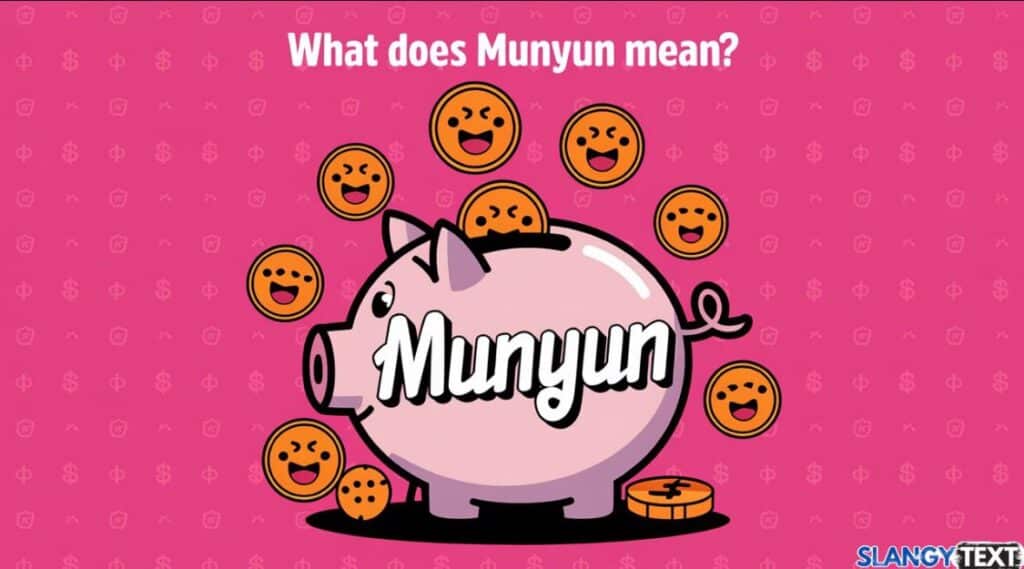In the ever-evolving landscape of internet slang, a new term has taken social media platforms by storm: “munyun”. This article delves into the meaning, usage, and real-life examples of this trendy expression that’s captivating the online world.
The Origins of Munyun
The term “munyun” emerged as a playful alternative to discussing money in online conversations. Its rise to popularity can be traced back to TikTok, where users began incorporating it into their videos and comments.
As with many internet slang terms, the exact origin of “munyun” is difficult to pinpoint. However, its usage has skyrocketed since early 2023, as evidenced by Google Trends data.
Munyun Defined Understanding the Slang
At its core, “munyun” is a creative way to refer to money or financial wealth. It’s often used in place of words like cash, dough, or bread – other popular slang terms for currency.
The appeal of “munyun” lies in its playful sound and the way it rolls off the tongue. It adds a lighthearted touch to discussions about finance, making it particularly popular among younger users on platforms like TikTok, Instagram, and Snapchat.
Munyun in Action Real-Life Examples
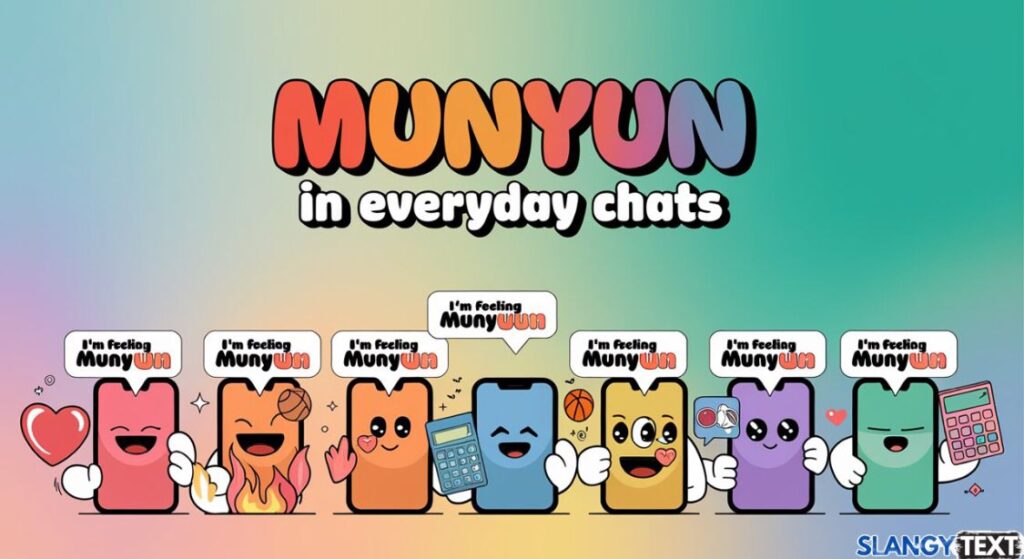
To better understand how “munyun” is used in everyday communication, let’s look at some real-life examples across various contexts.
| Sender | Message | Context |
|---|---|---|
| Emma | “Hey girl, got any munyun for pizza tonight?” | Casual request for money from a friend |
| Jake | “Just got paid! Munyun in the bank!” | Celebrating a payday |
| Olivia | “This new job is all about the munyun” | Discussing a high-paying job opportunity |
| Ethan | “Bro, can you spot me some munyun? I’ll pay you back next week” | Borrowing money from a friend |
| Sophia | “Saving up my munyun for that dream vacation” | Talking about financial goals |
| Liam | “Parents sent some extra munyun for groceries” | Receiving money from family |
| Ava | “This side hustle is bringing in some serious munyun” | Discussing additional income |
| Noah | “Lost all my munyun at the casino last night” | Sharing about gambling losses |
| Isabella | “Need to make that munyun move” | Planning to transfer funds |
| Mason | “Munyun’s tight this month, gotta budget” | Expressing financial constraints |
These examples showcase how “munyun” can be seamlessly integrated into various conversations about finance and daily life.
Also like to know this : What Does OMM Mean?
The Versatility of Munyun
One of the reasons for the rapid adoption of “munyun” is its versatility. It can be used in multiple contexts, from casual chats about splitting a bill to more serious discussions about financial wealth.
Munyun in Professional Settings
While primarily used in informal settings, “munyun” has started to creep into more professional contexts, especially in industries with a younger workforce.
| Employee | Message | Context |
|---|---|---|
| Alex | “The client’s munyun is ready for transfer” | Informal update on payment status |
| Sarah | “Team, we need to talk munyun for the new project” | Discussing budget in a team meeting |
| Michael | “Just closed a deal. Big munyun coming our way!” | Celebrating a successful sale |
| Rachel | “The munyun situation for Q3 looks promising” | Informal financial forecast |
| Daniel | “Need to allocate some munyun for new equipment” | Discussing resource allocation |
| Emily | “Can we shift some munyun from marketing to R&D?” | Proposing budget reallocation |
| David | “The investors are ready with the munyun” | Updating on investment status |
| Jessica | “We’re burning through munyun faster than expected” | Expressing concern about expenses |
| Christopher | “The new contract will bring in steady munyun” | Discussing a new revenue stream |
| Amanda | “Let’s review the munyun situation before the meeting” | Preparing for a financial review |
While these examples show the term’s versatility, it’s important to note that using “munyun” in professional settings should be done cautiously and only in appropriate contexts.
The Impact of Munyun on Digital Communication
The rise of “munyun” reflects broader trends in digital communication. As online interactions become increasingly casual, new slang terms emerge to express common concepts in fresh, engaging ways.
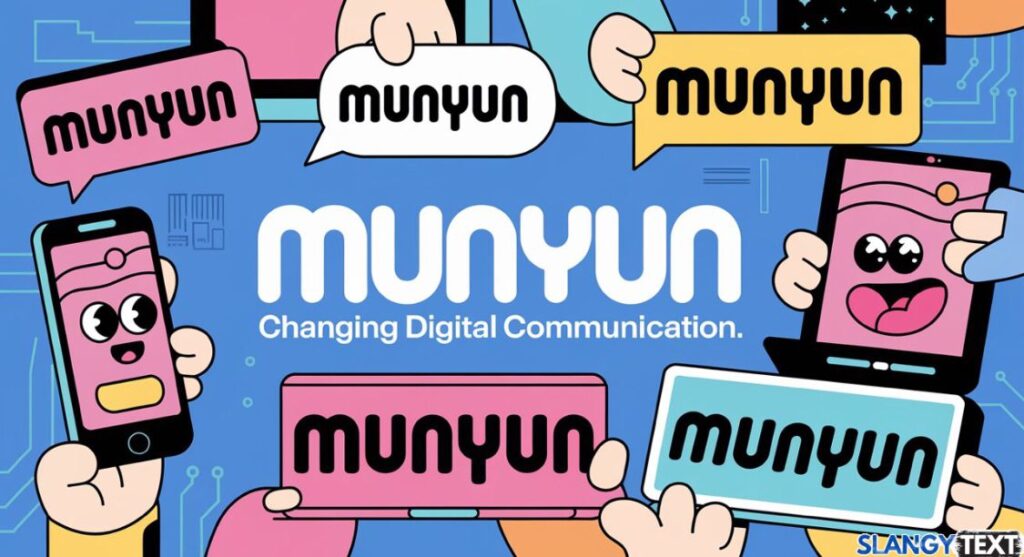
Munyun and Generational Differences
Interestingly, the adoption of “munyun” varies significantly across age groups. Younger users, particularly those active on TikTok and other social media platforms, are more likely to incorporate it into their daily lexicon.
| Age Group | Usage Frequency | Primary Platforms |
|---|---|---|
| 13-17 | Very High | TikTok, Snapchat |
| 18-24 | High | Instagram, Twitter |
| 25-34 | Moderate | Facebook, LinkedIn |
| 35-44 | Low | Facebook, Email |
| 45-54 | Very Low | Email, SMS |
| 55-64 | Rare | Email, SMS |
| 65+ | Almost Never | Traditional Communication |
| Parents | Occasional (when communicating with children) | Various |
| Educators | Low (in informal settings with students) | Educational Platforms |
| Marketers | Moderate (targeting younger demographics) | Various Social Media |
This generational divide in the usage of “munyun” highlights the ever-evolving nature of language in the digital age.
You might also like : What Does OPOR Mean?
Munyun Beyond Texting Verbal Usage
While “munyun” originated in texting and online communication, it has begun to make its way into verbal conversations, particularly among younger people.
Munyun in Pop Culture
The term has also started to appear in popular media, further cementing its place in contemporary slang. Here are some examples of how “munyun” has been used in various forms of entertainment:
| Media Type | Example Usage | Context |
|---|---|---|
| Song Lyrics | “Got the munyun, honey, let’s go spend it” | Pop song about wealth |
| TV Show Dialogue | “Yo, where’s the munyun at? We need to pay rent!” | Sitcom scene about financial struggles |
| YouTube Video Title | “How I Made Munyun Online” | Video about earning money on the internet |
| Podcast Episode | “The Munyun Mindset: Building Wealth in Your 20s” | Financial advice podcast |
| Meme Caption | “When the munyun hits your account on payday” | Humorous image about getting paid |
| Stand-up Comedy Bit | “My kid asked for munyun to buy a new game” | Comedian joking about modern parenting |
| Movie Dialogue | “We need more munyun for this heist” | Scene from a crime comedy |
| Book Title | “From Munyun to Millions: A Self-Made Success Story” | Motivational finance book |
| Social Media Challenge | “#MunyunChallenge: Show how you save” | Viral challenge about saving money |
| Video Game Achievement | “Munyun Master: Earn 1,000,000 in-game currency” | Gaming achievement |
These examples demonstrate how “munyun” has transcended its origins in texting to become a part of broader popular culture.
The Future of Munyun Will It Last?
As with many internet slang terms, the longevity of “munyun” is uncertain. While it’s currently enjoying widespread popularity, the fast-paced nature of online trends means its usage could decline as quickly as it rose.
Factors Influencing Munyun’s Staying Power
Several factors will determine whether “munyun” becomes a lasting part of our lexicon or fades into obscurity:
| Factor | Influence on Longevity | Explanation |
|---|---|---|
| Continued Use by Influencers | High | Endorsement by popular figures can sustain usage |
| Integration into Mainstream Media | Moderate | Appearance in TV, movies, and music can normalize the term |
| Adoption by Older Demographics | Low | Broader age range usage could indicate lasting impact |
| Evolution of Meaning | Moderate | Adapting to new contexts could extend relevance |
| Emergence of New Slang | High | Competition from newer terms could decrease usage |
| Global Spread | Low | Adoption in non-English speaking countries could boost longevity |
| Corporate Usage | Moderate | Use in marketing and branding could increase visibility |
| Educational Integration | Low | Acceptance in academic settings unlikely but impactful if occurs |
| Political/Social Movements | Low | Association with broader movements could extend relevance |
| Technological Changes | High | New platforms or communication methods could affect usage |
Only time will tell if “munyun” will join the ranks of enduring slang terms or become a fleeting linguistic fad.
Munyun in Different Contexts
The versatility of “munyun” allows it to be used in various situations, each with its own nuances. Let’s explore some of these contexts:
Also like to read this : What Does ICL Mean?
Munyun in Personal Finance Discussions
When it comes to personal finance, “munyun” often appears in conversations about budgeting, saving, and spending. Its casual nature can make these sometimes stressful topics feel more approachable.
| Scenario | Example Usage | Context |
|---|---|---|
| Budgeting | “Gotta watch my munyun this month” | Discussing financial discipline |
| Saving | “Putting away some munyun for a rainy day” | Talking about building savings |
| Unexpected Expenses | “Car broke down, there goes my munyun” | Lamenting unforeseen costs |
| Salary Negotiations | “Time to ask the boss for more munyun” | Preparing to discuss a raise |
| Splitting Bills | “Let’s divide the munyun for dinner” | Figuring out shared expenses |
| Loan Discussions | “Can you lend me some munyun till payday?” | Borrowing from friends |
| Investment Talk | “Thinking of putting some munyun in stocks” | Considering investment options |
| Gift Giving | “What’s the munyun limit for the office gift exchange?” | Planning for holiday expenses |
| Travel Planning | “Need to save munyun for that summer trip” | Budgeting for vacation |
| Debt Repayment | “Finally paid off my student loan munyun!” | Celebrating financial milestone |
These examples show how “munyun” can add a light-hearted touch to various aspects of personal finance discussions.
The Psychology Behind Munyun Usage
The popularity of “munyun” raises interesting questions about the psychology of language and communication. Why do people choose to use this term instead of more traditional words for money?
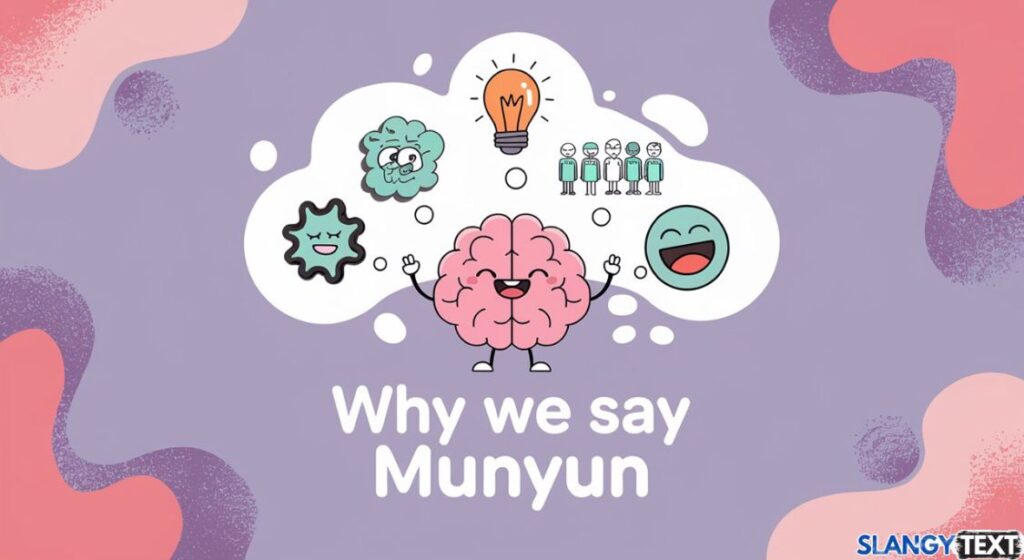
Reasons for Munyun’s Appeal
Several factors contribute to the appeal of using “munyun” in conversations:
| Psychological Factor | Explanation | Example |
|---|---|---|
| Novelty | The newness of the term makes it exciting to use | “Check out this new word I learned: munyun!” |
| In-Group Signaling | Using the term shows belonging to a particular social group | “Only my closest friends understand when I talk about munyun” |
| Emotional Distance | Can make discussing money feel less serious or stressful | “Let’s talk about the munyun situation” feels lighter than “Let’s discuss our financial status” |
| Humor | The sound of the word can add levity to conversations | “Show me the munyun!” said in a playful tone |
| Rebellion | Using slang can feel like a small act of defiance against formal language | A teenager saying “I need more munyun” instead of “I require additional funds” |
| Simplicity | One word to replace various terms for money | “Munyun” can replace “cash,” “dough,” “bread,” etc. |
| Creativity | Allows for wordplay and creative expressions | “Munyun Monday” to refer to payday |
| Trendiness | Using the term makes one feel current and hip | “I’m not old, I know what munyun means!” |
| Softening | Can make asking for money feel less demanding | “Got any munyun to spare?” feels softer than “Can you give me some money?” |
| Universality | A catch-all term for various financial concepts | Can refer to cash, digital currency, wealth, etc. |
Understanding these psychological factors can provide insight into why certain slang terms, like “munyun,” gain popularity while others fade away.
You might also like : What Does IDM Mean?
Munyun and Financial Literacy
While “munyun” is primarily used in casual contexts, its popularity has sparked discussions about financial literacy, especially among younger generations.
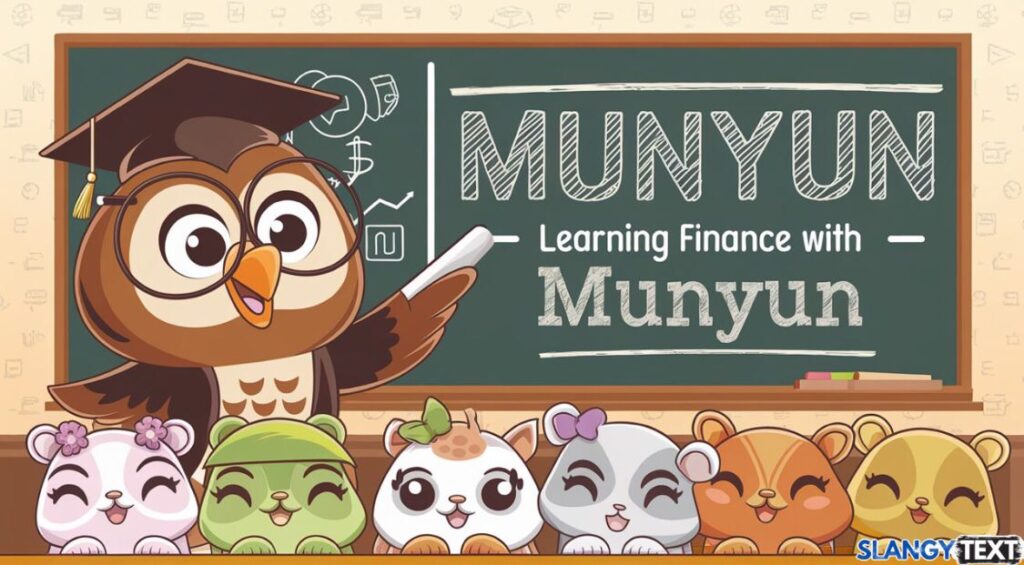
Using Munyun to Teach Finance
Some educators and financial advisors have begun incorporating “munyun” into their teachings as a way to engage younger audiences. Here are some examples:
| Educational Context | Usage Example | Purpose |
|---|---|---|
| High School Economics | “Let’s talk about how to manage your munyun” | Making finance relatable to teens |
| College Financial Aid | “Understanding your munyun options for tuition” | Simplifying complex financial aid concepts |
| First Job Seminar | “Budgeting your first real munyun” | Introducing young adults to personal finance |
| Investment Workshop | “Growing your munyun through smart choices” | Making investment concepts less intimidating |
| Credit Card Education | “Using plastic munyun responsibly” | Teaching about credit card usage |
| Savings App Tutorial | “Track your munyun with our easy app” | Promoting financial management tools |
| Debt Counseling | “Strategies to tackle your munyun troubles” | Addressing debt in a less threatening way |
| Entrepreneurship Class | “Securing munyun for your startup” | Discussing business finance |
| Tax Preparation Course | “Understanding how Uncle Sam takes your munyun” | Simplifying tax concepts |
| Retirement Planning | “Ensuring you have enough munyun for the future” | Introducing long-term financial planning |
By using familiar language, these educators hope to make financial concepts more accessible and less intimidating to younger audiences.
The Global Spread of Munyun
While “munyun” originated in English-speaking online communities, its usage has begun to spread globally, crossing language barriers and cultural boundaries.
Munyun Around the World
Here’s how “munyun” is being adopted and adapted in different countries:
| Country | Local Adaptation | Usage Example |
|---|---|---|
| France | “le munyun” | “J’ai besoin de plus de munyun pour mes vacances” |
| Japan | “マニュン” (manyun) | “マニュンが足りない” (I don’t have enough munyun) |
| Brazil | “munião” | “Preciso de mais munião para comprar um carro” |
| Germany | “das Munyun” | “Hast du genug Munyun für das Konzert?” |
| Spain | “el muñón” | “Necesito muñón para pagar el alquiler” |
| India | “मन्यून” (manyoon) | “मुझे और मन्यून की ज़रूरत है” (I need more munyun) |
| Russia | “манюн” (manyun) | “У меня нет манюна на эту неделю” (I don’t have munyun for this week) |
| South Korea | “머니언” (meonieon) | “머니언 좀 빌려줄래?” (Can you lend me some munyun?) |
| Italy | “il muniun” | “Ho bisogno di più muniun per le spese” |
| Nigeria | “munyun” | “Abeg, give me small munyun” |
This global spread demonstrates the universal appeal of the term and its ability to transcend linguistic and cultural barriers.
Conclusion The Future of Munyun in Digital Communication
As we’ve explored throughout this article, “munyun” has rapidly become a significant part of online slang and digital communication. Its rise from a niche TikTok term to a widely recognized expression for money showcases the dynamic nature of language in the internet age.
You might also like to read this : What Does Casi-Algo Mean?

Kayla Rogers is a writer at Slangy Text who loves exploring modern acronyms & slangs and how they shapes our conversations. She enjoys sharing fun and interesting articles that connect with readers. When she’s not writing, Kayla likes to keep up with the latest trends or relax with a good book.

